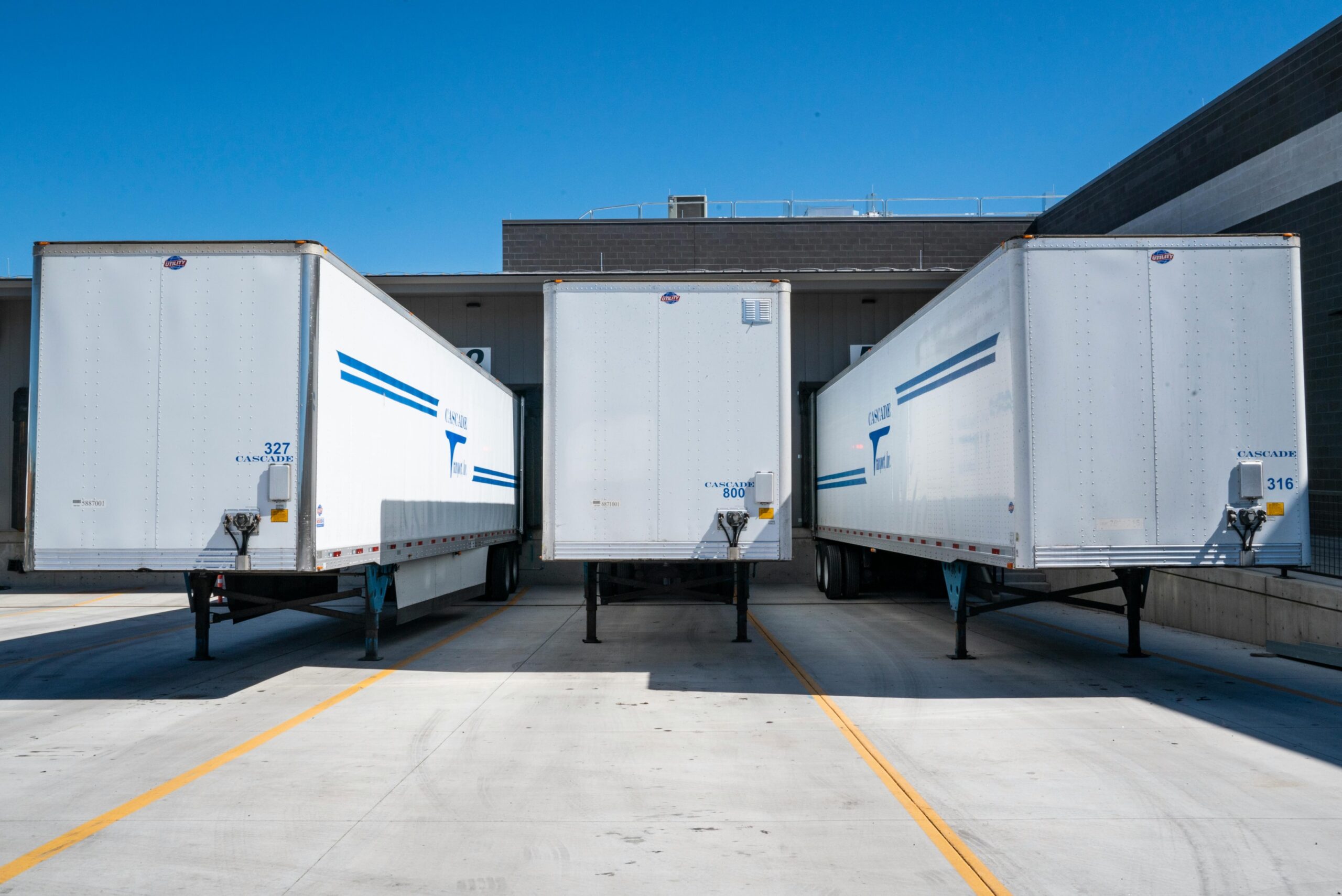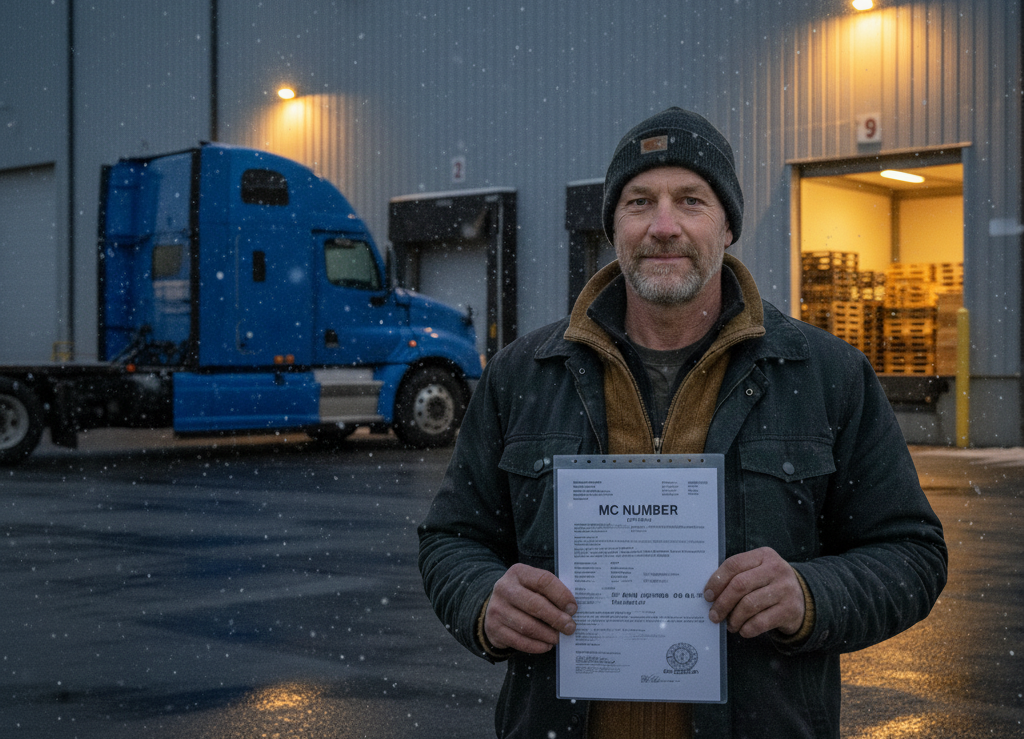Starting a trucking business can be an exciting and profitable venture, but it comes with significant upfront costs. The financial demands can be overwhelming, from purchasing vehicles and securing necessary permits to hiring truck drivers and covering operational expenses.
However, you can seek financial assistance from a range of sources when starting a trucking business. One of the common options for that is grants. They come from federal, state, and private sources and help cover a wide range of expenses, including purchasing equipment, hiring truck drivers, and implementing sustainable practices.
Trucking grants can come in different types, focusing on minorities, specific aspects, or geographical regions. Whether you’re a first-time entrepreneur or an experienced owner looking to expand, understanding the grant landscape can give your business the financial boost it needs to succeed.

What Are Trucking Grants and Why You Should Consider Them?
Trucking grants are financial assistance programs designed to help individuals and small businesses enter or grow within the trucking industry. They are usually funded by government agencies, nonprofit organizations, or private institutions to support small businesses, economic development, and sustainability.
Grants for starting a trucking business can cover initial expenses like purchasing trucks, maintaining equipment, or managing operational costs. By securing grants, you can reduce the financial burden of launching your business.
Whether you’re an owner-operator or planning to launch a fleet, grants to start a trucking business can provide the financial boost needed for a start. These funds benefit startups, as they often come with fewer repayment obligations than loans.
If you’re exploring funding opportunities, you can find grants that help with training, certifications, and regulatory compliance. Investing time in researching and applying for these grants can make a difference in your trucking journey.
Benefits of Trucking Grants
Lower financial burden. Launching a trucking business requires a significant upfront investment, such as purchasing trucks or obtaining insurance. Grants for starting a trucking company can reduce this burden, giving small business owners the flexibility to allocate their funds to other critical areas like marketing, technology, or hiring.
No repayment obligation. Unlike loans, grants do not involve repayment. Thus, they’re a risk-free option to secure initial funding for a business launch. This is especially beneficial for startups that may face financial struggles in the early stages. With grants to start a trucking company, small business owners can invest in necessary resources without worrying about repayments or debt.
Options for diverse needs. Trucking grants can cover a wide range of business needs. Whether you’re purchasing vehicles, upgrading equipment, enhancing safety measures, or meeting compliance requirements, you can find an option specifically for your goals. Some programs may prioritize specific initiatives, such as improving fuel efficiency or adopting green logistics practices.
Encouragement of innovation and sustainability. Some grant programs aim to promote innovation within the trucking industry. For instance, grants can support small businesses in the transition to electric trucks, reduce carbon footprints, or lower long-term operational costs.
Types of Trucking Grants
By researching available options and submitting string applications, you can secure funding to bring your vision to life and ensure a successful start in the trucking sector.
Small Business Administration (SBA) grants. The Small Business Administration offers grants for small companies. They usually focus on underserved or rural areas.
State and local grants. Many state governmental bodies provide grants for starting trucking business. This is a part of their initiatives to boost economic development in their regions.
Environmental and sustainability grants. Programs like the EPA’s Diesel Emissions Reduction Act (DERA) offer grants to trucking businesses looking to upgrade to cleaner, more fuel-efficient vehicles.
Minority and women-owned business grants. Organizations and government grants often provide support specifically for minority and women entrepreneurs in the trucking industry.
Veteran-specific grants. Veterans transitioning to civilian careers may apply for grants. The aim of these initiatives is help them leverage their skills in a new industry.
Top Grants to Start a Trucking Company
Securing a grant can ease the financial challenges of starting a trucking business. You can review the most common grant programs proposed for trucking entrepreneurs or newcomers to the industry. Ensure you’re aware of the specifics and benefits of each option to make an informed decision.
Small Business Innovation Research Program
The SBIR program is a federal initiative that provides funding for small businesses to develop innovative solutions and technologies. This program isn’t exclusive for the trucking sector, still companies in the logistics industry can use it for fleet management innovations or sustainable trucking technologies.
The SBIR is designed to support small businesses and entrepreneurs focused on creating innovative products or services in the trucking or transportation industry.
Its funding is divided into two phases. The first step is dedicated to feasibility studies, while the second phase is for new business development and implementation.
You can apply for this grant through related federal agencies like the Department of Transportation (DOT).
State and Local Economic Development Grants
Many state and local government grants are focused on promoting small business growth, especially in industries like trucking that support regional economic development. These grants often aim to create jobs and improve infrastructure.
These grants are focused on small trucking businesses, startups, and individuals operating within specific states or municipalities.
State grants can provide funding to cover startup costs, licensing fees, driver training, and equipment purchases. In addition, they can involve additional resources like business counseling or tax incentives.
To apply, entrepreneurs should contact their state’s Department of Transportation or Small Business Development Center.
Minority and Women-Owned Business Grants
Several organizations and government agencies provide funding opportunities for minority and women-owned companies in the trucking industry. These grants aim to address economic disparities and promote diversity in entrepreneurship.
These grants provide financial support for startup costs, vehicle purchases, or business expansion. They can also provide access to mentorship programs, business networks, and training resources.
If you comply with the regulatory requirements of these programs, you can apply through the Minority Business Development Agency (MBDA).
Veteran Small Business Grants
A range of organizations, including the DSBA and nonprofit organizations, offer grants to help veterans transition into entrepreneurship. This option is ideal for veterans looking to start trucking companies.
Veteran-owned business opportunities offer funding assistance for vehicles, permits, and operational costs. They also offer access to business training and mentorship.
FedEx Small Business Grants
FedEx conducts an annual competition offering grants to small businesses. The program supports startups with innovative ideas or strong business potential, providing grants for new trucking companies. The award includes cash prizes with the top amount of $50,000. In addition, winners obtain FedEx shipping credits and print services.
Applicants must submit a business plan and a short video showcasing their company’s story on the program’s website.
Other Financial Resources to Start a Trucking Business
While grants for new trucking companies are an excellent way to secure funding, there are other financial resources available. You can rely on a combination of grants, loans, and alternative funding options to cover startup and operational expenses. Each option offers unique benefits and resources. With the right funding, you’ll be well-positioned for success in the trucking industry. For instance, you can use one of the following resources for your trucking operations.
Small Business Loans
This is one of the most popular ways to secure funding for trucking startups. SBA loans can be used for a variety of expenses, including purchasing vehicles, obtaining a license, and covering insurance costs.
The Small Business Administration (SBA) offers loans with lower interest rates and longer repayment terms than usual loans. This can be a suitable option for a trucking business that needs substantial capital.
In combination with a trucking grant, SBA loans can help reduce financial pressure while allowing small business owners to expand their fleet or services.
Crowdfunding Platforms
Crowdfunding is an increasingly popular way for entrepreneurs to raise funds for their projects. Platforms like Kickstarter, GoFundMe, or Indiegogo let you present your trucking business idea to potential supporters.
With a compelling campaign that explains your business goals and funding needs, you can attract significant contributions.
Crowdfunding allows you to build a community of support while raising capital without incurring debt.
While this option can’t replace grants for new trucking companies, it can provide a financial boost and demonstrate public interest in your business.
Partnerhips or Investors
Collaborating with other entrepreneurs or companies or seeking investors can provide the financial backing for a trucking business launch. With a reliable partner, you can pool resources, share responsibilities, and reduce individual financial risk.
You can look for private investors or venture capital firms to obtain funding in exchange for equity or a share in your business.
This option can offer the financial stability and strategic support needed to grow your company.
Tax Incentives
Federal and state governments offer tax incentives and rebates, providing financial support for trucking companies. You can increase your chances of achieving these benefits by adopting sustainable practices or operating in certain regions.
For instance, this approach includes incentives for purchasing energy-efficient vehicles and rebates for operating in rural or economically distressed areas.
Tax incentives can reduce your overall operational costs, freeing up more funds for new business expansion.
Fuel Cards
This is a practical financial resource for trucking businesses. Fuel cards help manage fuel expenses, providing additional savings and benefits. They’re designed specifically for trucking companies to streamline fuel purchases and track spending.
Fuel cards function like credit or debit cards, but exclusively for purchasing fuel at partner locations. Еthey can provide significant discounts at gas stations and provide tracking features. Thus, truck drivers can easily manage fuel costs and reduce this part of trucking expenses.
Some fuel cards propose flexible payment terms, allowing trucking companies to maintain cash flow for other operational needs.
Is a Trucking Business Grant Right for You?
Starting a trucking company requires a significant upfront investment. Thus, it’s needed to find the right financial resources. Grants for starting a trucking business can provide much-needed funding, but they aren’t a suitable solution for all situations. You should evaluate your circumstances, goals, and resources to determine if pursuing a grant is the right choice.
Understanding your needs and goals. Every business has unique financial management. They depend on factors like size, service offered, and target market. A grant for starting a trucking company will be an ideal option if you need funds to cover startup investments, such as purchasing trucks, trailers, or permits.
Assessing your eligibility. Most grants for new trucking companies have strict criteria that you need to understand if you are planning to apply for a grant. Usually, these criteria involve:
Demographics. Some grants are designed for specific groups like women, veterans, or minority entrepreneurs. For instance, the Amber Grant provides funds for women-owned businesses, while veterans can obtain funds through specialized programs like the Veterans Advantage Program.
Business location. Many grants focus on businesses operating in economically distressed or rural areas. Programs like the New Markets Tax Credit (NMTC) encourage startups in specific regions.
Industry goals. Grants often prioritize trucking businesses that contribute to sustainability, job creation, or technological innovation. If your startup aligns with the requirements for a grant, this could be a great opportunity to secure funding.
Considering the competitive application process. Grants often involve a difficult application process, and competition can be intense. To obtain funding and stand out, you should:
Create a strong business plan. Outline your goals, strategies, and your plans for using the grant funds.
Provide financial projections. Grant reviewers often require detailed financial statements and projections. This is needed to assess your business’s potential for success.
Demonstrate impact. Describe how your business aligns with the grant’s objectives. This can be creating jobs, reducing emissions, or supporting underserved communities. The application process requires time, effort, and attention to detail. If you’re prepared to invest in crafting a compelling application, you can obtain the necessary funds for launching trucking operations.
Choosing between funding options. While grants to start a trucking business are incredibly helpful, they rarely cover all startup costs. You can combine a grant with other financial resources to create a comprehensive funding strategy. For instance, you can pair grant funds with small business loans to cover larger expenses like fleet expansion. The other option is to use fuel cards alongside grant funding.
Grants can provide a financial foundation. On the other hand, a diversified approach ensures your business is equipped to handle initial capital and ongoing costs.
Evaluating long-term benefits. In addition to immediate funding, grants can set your new business up for long-term success. For instance, it can involve investments in high-quality equipment, strengthening your financial stability, or enhancing your reputation through demonstrating your credibility.
Moreover, some trucking business grants come with additional benefits, such as a business development program, networking opportunities, or access to resources that can boost your trucking business growth.
Evaluating the pros and cons. Like any other financial resource, grants come with advantages and challenges. For instance, the common pros of the grants include no repayment, funding for specific business initiatives, and additional support like training. On the other hand, the cons of the grants include a competitive and time-consuming application process, strict eligibility criteria, and specific use of the obtained funds.
Pursuing a grant can be a suitable option if you want to minimize financial risks and focus on sustainable business growth. However, before applying, you should assess whether you have the time, resources, and alignment with grant objectives and requirements.
Tips for Applying for Trucking Company Grants
Securing grants for starting a trucking business requires a thorough application process. This involves strategic planning, attention to detail, and persistence. Small business owners can follow these tips to prepare a winning grant application.
Conduct thorough research. Understand the grant landscape. Each option has its own requirements, funding goals, and timelines. Focus on grants that align with your needs, such as grants for starting a trucking company targeting startups, sustainability, or business development.
Don’t overlook local and regional trucking business grants, as they often have less competition and are easier to secure.
Create a reliable business plan. A strong business plan is the basis of most grant applications. It can demonstrate your company’s vision and viability to grant reviewers.
Your business plan should include a mission statement, market analysis, financial projections, funding usage plan, and growth strategy. With all these details, you can strengthen your application while providing a roadmap for your business growth in the industry.
Tailor your application to each grant. Submitting a generic application is one of the biggest mistakes applicants make. Each grant has specific goals, such as promoting sustainability, supporting underserved areas or rural communities, or fostering job creation.
Highlight how your trucking company aligns with the grant’s purpose. For instance, if you apply for an eco-focused grant, emphasize plans to use fuel-efficient or electric vehicles. Tailoring your application to the grant’s objectives demonstrates your commitment and understanding of the program’s mission.
Pay attention to details. Many grant applications are disqualified amid simple errors, such as incomplete submissions or missing documentation. Carefully read the grant instructions and include all required materials, such as business plans, financial statements, and letters of recommendation.
You can create a checklist to ensure nothing is overlooked. Include all attachments, signatures, and supplementary documents before submission. Attention to detail reflects professionalism and increases your credibility.
Highlight your value proposition. Grant providers are often looking for new businesses that stand out. Make sure the application includes what sets your trucking company apart. Highlight unique services or technologies your company plans to implement, such as advanced routing software or green logistics solutions. A clear and compelling narrative about your trucking company’s value can make your application memorable.
Include measurable goals. Grant reviewers want to see how their funding will create tangible results. For instance, you should specify measurable outcomes, such as number of truck drivers you’ll hire, the number of trucks, or the revenue you aim to generate.
Providing concrete, achievable goals to demonstrate your commitment and ensure your plans can deliver results.
Leverage professional assistance. You can seek help from experts to simplify the application process. You can hire professional grant writers or cooperate with small Business Development Centers for grant application support. The other option is to connect with industry experts to seek advice and valuable guidance.
Conclusion
Securing grants to start a trucking business can be a pivotal step toward turning your business plans into a thriving reality. The financial assistance provided by these grants can help reduce the burden of startup costs and provide flexibility. Thus, you can focus on building a strong foundation for your company.
By carefully researching available trucking business grants and ensuring your application is thorough and tailored to specific requirements, you can greatly improve your chances of success. Remember that applying for grants is a competitive process, and persistence is key. With careful planning, attention to detail, and professional guidance if needed, you can secure the funding necessary to grow your trucking business.
Additionally, you can use other financial resources such as SBA loans, fuel cards, or equipment financing, to greatly improve your chances of success. Keep exploring funding options, stay organized, and take the next step toward realizing your business goals.




